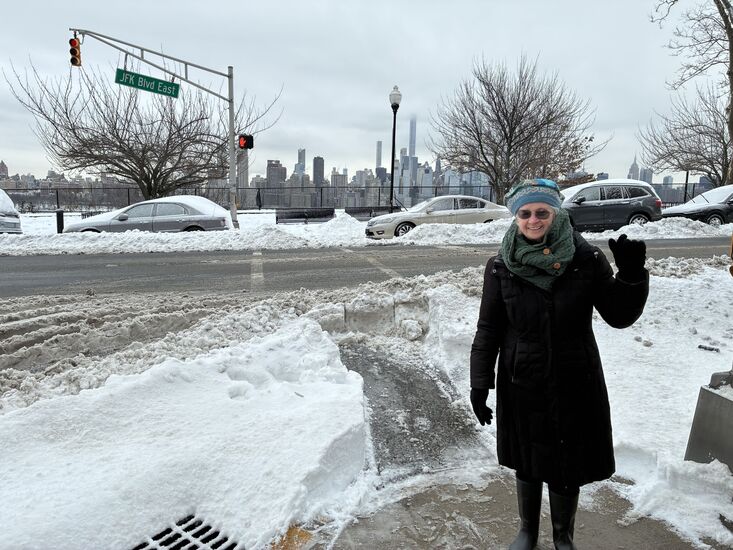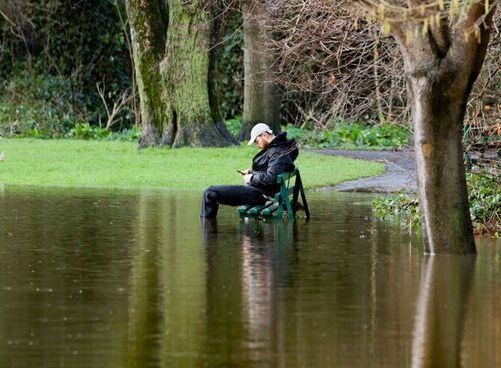Max Boot is a conservative thinker who has changed his mind about climate change. “REAL TIME WITH BILL MAHER”/VIA YOUTUBE
Between the Lines / By Peter McDermott
Some months ago, the two people immediately ahead of me at the checkout line at my local supermarket got involved in a discussion about climate change. I’m not sure how it started. The man closest to me was middle-aged, short of stature, extroverted and, as it turned out, Indian-born, and maybe he said something about plastic bags, the kind of thing that can spark an environmental debate. The other man was a bulkier, taller, quietly-spoken white European in his mid-to late 70s, and when he reached the register, he turned to his interlocutor, saying: “I think there’s some change, but it’s very much exaggerated. It’s all about the headlines. They have to write about something.”
At this point, I interjected to say that the U.S. armed forces and NASA took it seriously enough. The man stared at me for a moment, wordlessly took his receipt, turned around and walked off, without further comment.
I have that effect on people sometimes.
The Indian man said to me, continuing the discussion out on the street: “You see, the older people feel guilty about the state they’re leaving world in.”
I gave my best “maybe” grimace that’s really saying: “nonsense,” before suggesting the obvious alternative. That senior is in denial, and guilt has nothing to do with it. He’s been sold a line and he is sticking to it. Our elders once upon a time were the people we looked to for wisdom; now the young people are fully engaged and paying attention while too many of their grandparents are sitting at home having their brains fried by “Fox & Friends” and Sean Hannity (who would have it that the entire scientific community is on an extreme leftwing plot to overthrown capitalism).
Headed our way
Anyway, I thought of this episode with the recent publication of the United States government’s 13-federal agency 1,600-page report on climate change that Trump dismissed and which his press secretary Sarah Huckerbee Sanders said was “not based on facts.”
And to the man’s point about “headlines,” I can recall an opinion piece from the Irish Times of a half-decade ago that made precisely the opposite point.
The writer asked: what if the world’s top astrophysicists told us that a “killer comet” or a “killer asteroid” was headed for Planet Earth in seven or eight years into the future, let’s say, threatening calamity and that we had to figure out very quickly a plan to avoid it. You couldn’t keep something like that off the front page on a daily basis, the writer argued. Instead the creeping catastrophe caused by humanity itself has proven far harder to make newsworthy.
A colleague said to me this week that part of the problem was the initial branding of the problem. Instead of “warming,” they should said have said “heating.” And he added: “Global melting would have been even better.”
“Climate change,” we might say, is also more effective than “warming” because people instinctively know something is up. At some point, however, the plan was conceived not to push an alternative science – such, in any case, was the consensus that something radical had to be done. (In fact, when you have about 82 percent of experts arguing for something, then it’s considered a consensus; in the case of climate change almost 100 percent of people with post-doctoral degrees and published papers in this area are saying time is running out.) That plan (developed by lobbyists working for vested interests) was to engage in the tactic of throwing doubt on the science itself.
One of America’s most accomplished – and bravest – investigative journalists, Jane Mayer, has shown in her book “Dark Money” how just when the political class was about to address this calamity in waiting, a big chunk of it was bought off.
Forty years ago, the politicians listened to the scientists and took action on the Ozone layer. What if instead for years equal weight was given in the mass media to an unscientific view that it wasn’t a problem? That didn’t happen, but it did happen in relation to climate change.
A history of denial
Now, for those of us who are paying attention even reading a newspaper caption can be a bit depressing. Take this one from the Guardian the other day accompanying a Reuters photograph: “The drought-stricken La Sorrueda reservoir in Gran Canaria, Spain. Rising emissions could trigger extreme weather events around the world, the UN says.”
Unfortunately, there is a history of science denial in this country. Many Christian fundamentalists and evangelicals – in contrast to mainline Protestants, Catholics, Jews and people from other faiths – reject the science on principle that says the Earth is millions of years old.
There are quite a few examples of science denial, too, in other countries. Take Germany. Adolf Hitler, for one, was very upset to hear the news that big developments in agricultural production would mean that food shortages would increasingly become a thing of the past. This directly went against his notions of survival of the fittest and his vision of what he considered superior races winning battles for scarce resources, and so he rejected the science behind the news.
You might argue on the face of it, climate-change denial is the opposite to that, in that it has an optimistic take on the future. But the denial is for the same reason – unwillingness to take in something because it goes against preconceived dogma or vested interests. Hitler was not generally a science doubter. He fully accepted it when he liked what it had to say and it’s the same with the climate change-deniers: they’re willing to accept every scientific advance that doesn’t go against cherished beliefs.
The U.S., in contrast, was founded by people who respected science. The country’s leadership in the world is based in large part on its mastery of it. Climate-change analysis is based to a great degree on American data and models. Now we have a political faction that wants to stop that knowledge getting into the wider world. These sorts of activities and science denial in general amount to an abdication of moral leadership.
It’s already been reported that key Republicans – such as the so-called “adults in the room” like White House Chief of Staff John Kelly – accept the military’s analysis of this crisis, even if politically it’s hard to take a public stand.
One hopes that the Nov. 26 column from Max Boot in the Washington Post is a sign of things to come. He began: “I admit it. I used to be a climate-change skeptic. I was one of those conservatives who thought that the science was inconclusive, that fears of global warming were as overblown as fears of a new ice age in the 1970s, that climate change was natural and cyclical, and that there was no need to incur any economic costs to deal with this speculative threat. I no longer think any of that, because the scientific consensus is so clear and convincing.”
He quoted the Fourth National Climate Assessment, released by the government days before: “Observations collected around the world provide significant, clear, and compelling evidence that global average temperature is much higher, and is rising more rapidly, than anything modern civilization has experienced, with widespread and growing impacts.”
Boot said: “The U.S. government warnings echo the United Nations’ Intergovernmental Panel on Climate Change. In October, it released a report that represented the work of 91 scientists from 60 countries. It describes, in the words of the New York Times, ‘a world of worsening food shortages and wildfires, and a mass die-off of coral reefs as soon as 2040.’
‘Captives to rigid ideology’
“The wildfires are already here,” the columnist continued. “The Camp Fire blaze this month is the most destructive in California history, charring 153,000 acres, destroying nearly 19,000 structures, and killing at least 85 people. The second-most destructive fire in California history was the one last year in Napa and Sonoma counties. The Yale School of Forestry and Environmental Studies notes that climate change has contributed to these conflagrations by shortening the rainy season, drying out vegetation and whipping up Santa Ana winds. Massive hurricanes are increasing along with wildfires — and they too are influenced by climate change.”
He went on: “It’s time to sound the planetary alarm. This is likely to be the fourth-hottest year on record. The record-holder is 2016, followed by 2015 and 2017. A climate change website notes that ‘the five warmest years in the global record have all come in the 2010s’ and ‘the 10 warmest years on record have all come since 1998.’”
He added later: “By this point, no one should be surprised that the president can’t tell the difference between short-term weather fluctuations and long-term climate trends. At least he didn’t repeat his crazy suggestion that climate change is a Chinese hoax. Yet his denialism is echoed by other Republicans who should know better.”
Boot pointed to a few honest libertarians and conservatives who see disastrous impacts ahead and concluded: “I’ve owned up to the danger. Why haven’t other conservatives? They are captives, first and foremost, of the fossil fuel industry, which outspent green groups 10 to 1 in lobbying on climate change from 2000 to 2016. But they are also captives of their own rigid ideology. It is a tragedy for the entire planet that the United States’ governing party is impervious to science and reason.”







